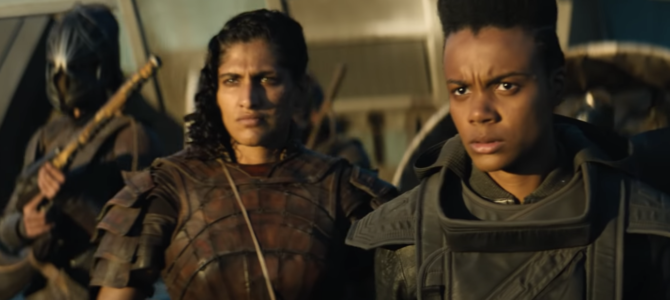
Apple TV+ has been on the hunt for its own serialized fantasy drama to compete with HBO’s adaptation of “Game of Thrones,” and it may have just found it in bringing Isaac Asimov’s “Foundation” to their streaming platform. If successful, it’ll be an impressive feat for a creative property once considered “unfilmable.”
Ever since “Game of Thrones” redefined serialized fantasy drama, every major up-and-coming “new” network has been hoping to find its own expensive genre epic. Netflix has “The Witcher,” Amazon’s pouring hundreds of millions into “The Lord of The Rings,” and now Apple TV+ has taken on the seemingly insurmountable task of converting Asimov’s seminal sci-fi novels and winners of the special 1966 Hugo Award for Best All-Time Series into an expansive streaming series.
An ‘Unfilmable’ Book
It’s not easy to sum up what “Foundation” is about because the main “character” isn’t actually a person; it’s a kind of math. At the center of the story’s premise is something called psychohistory, a way of using mathematics to analyze the behaviors of large populations. So in this fictional world, that means you can whip out a calculator to predict the future in broad strokes, which is exactly what a man named Hari Seldon does.
Beyond that, it gets too complicated to explain, especially if you’re unfamiliar with the original Asimov. So “Foundation” ends up bearing some unfortunate stretch marks from its necessary reshaping and restructuring. But that’s where Apple comes in and does what it does best. It spends cash. It uses a significant budget for a formidable, dazzling, and intentionally distracting effect.
Instead of doing its best to faithfully recreate its source material’s most iconic characters and storylines, Apple used Asimov’s texts as inspiration for a markedly different version. In so doing, they’ve changed it into something more timely and fitting for today’s TV rather than yesterday’s page, this iteration of “Foundation” quickly becoming not only all its own, but very intentionally “now.”
If you’re an original “Foundation” fan who hoped the series wouldn’t undermine the books, you’ll probably be satisfied enough. Barely. For now. If you’re a sci-fi mega-fan in search of a spectacle that looks like it costs a billion bucks, you’ll be more than impressed.
The series features Jared Harris, a strong start and a fitting foundation as the psychohistorian, and Seldon, whose goal is to save humanity from its own self-destructive destiny. Bear McCreary created the series score, so it immediately sounds like a time-tested sci-fi fantasy.
Its writer and showrunner is David S. Goyer, who previously penned “Dark City,” “Batman Begins,” and “The Dark Knight.” The pedigree across the board is second to none, all of it essentially a scaffold for the landmark influential epic that dates back almost 80 years to its genesis as a series of short stories published in the heyday of formative sci-fi.
While Asimov remains a seminal sci-fi figure, it’s not an accident that Hollywood took so long to crack this saga. There are no aliens to battle. All of the characters’ problems began and ended with man –– in both the human sense and the patriarchal sense. (More on that in a moment.) Also, ultimately, because of the great lengths of time covered in his work, Asimov explored the evolution and distortion of human fears as they passed down through generations.
Updating a Classic for Modern Identity Politics
So while Goyer manages to maintain the bones of the books, his most significant impact is intentionally taking considerable liberties in fleshing them out and mostly in “woke” ways. Characters are recreated in hopes of eliciting emotions that weren’t present in the text while keeping up with today’s character “alterations,” “identity necessities,” and “diversity management.”
Apple’s adaptation modernizes and diversifies the book’s mostly male characters. The reason there are no love stories in the original is that there are virtually no women. That’s simply a deal-breaker in today’s world, so Seldon’s disciple Gaal Dornick and Terminus’s mayor Salvor Hardin, both men in the books, are played by female nonbinary actors, Lou Llobell and Leah Harvey. A male-presenting android Demerzel, who arrives much earlier in the TV version than in the book, is played by Laura Birn and expresses “transitional” identity and transgender characteristics.
Goyer’s team claims that beyond implicit identity politics depictions, the specific recasting of characters provides effective ways to explore the lives of “survivalists.” If humanity’s looking at its demise, what does it mean to bring a child into this world? Is it worth leaving a soulmate to discover life’s purpose? Goyer’s approach claims that intimate moments woven into the political thriller may make the series more watchable and accepted, without losing the elements that made the original story a classic.
As far as aesthetics go, the series looks impressive, mesmerizing, and distinct. Apple’s ample budget allowed for boundless special-effects possibilities. By bouncing from city-planet Trantor to windswept Terminus with side trips to other planets and some escapades in space, the series sends postcards from every variety of futuristic locales. The pricey production is steeped in the visual imagery of art-deco futurism, modified combat garb, and sleek aeronautic concept designs, and borrows from visual predecessors without repeating a single look.
“Foundation” has already beaten expectations by coming out at all, but for die-hard fans, it falters. With a sweeping cosmic narrative more devoted to characters “calculating the future” than anything resembling human choices or achievements, let alone mistakes, it simply lacks heart.
Goyer has voiced his intention for the series to run at least 80 episodes –– that’s eight seasons –– so he’s almost given it an “inevitability” based on the scope of the task at hand. And Apple TV+ is absolutely backing those big plans, knowing full well that even “Game of Thrones” was once believed to be “unfilmable” too.









